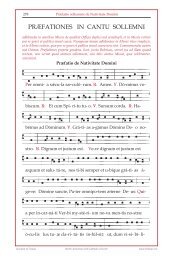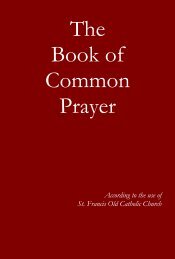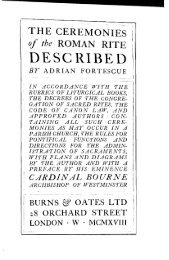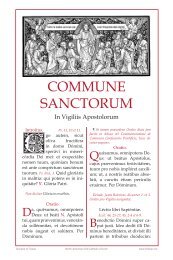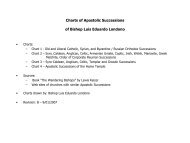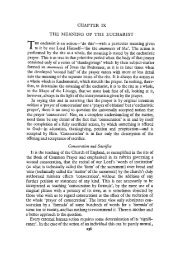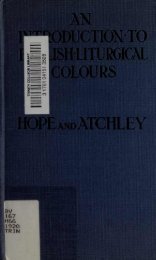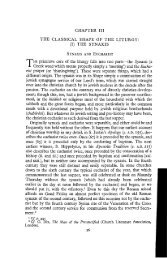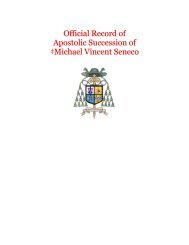Eucharist and Lord's Supper
Eucharist and Lord's Supper
Eucharist and Lord's Supper
You also want an ePaper? Increase the reach of your titles
YUMPU automatically turns print PDFs into web optimized ePapers that Google loves.
EUCHARIST AND LORD'S SUPPER 99<br />
ends of the supper. Neither argument is decisive, indeed, either separately<br />
would seem rather trivial. But they both point in the same direction.<br />
The next point is the introduction of the word 'agape' as a technical<br />
term for the christian common meal (whether with or without the eucharist).<br />
This occurs in the New Testament only at Jude 12 (<strong>and</strong> perhaps also<br />
in 2 Pet. ii. 13 if apatais be not the true reading) where certain heretics are<br />
denounced as 'blemishes feasting with you in your agapai.' There is here no<br />
apparent reference to the eucharist, but only to a christian 'feast'. The new<br />
term had presumably been introduced to describe a new observance, the<br />
supper apart from the eucharist. But this is found only here, among the<br />
later strataof the New Testament, in the second christian generation.<br />
In the next generation the new word has become a technical term used<br />
by distinction from 'the eucharist' to describe the observance, now becoming<br />
traditional, of the supper altogether apart from the liturgical<br />
eucharist. Writing to the Smyrnaeans, Ignatius (c. A.D. 115) warns them:<br />
'Without the bishop let no one do any of the things which pertain to the<br />
ecclesia. Let that be accounted a valid eucharist which is under the bishop<br />
(as president) or one to whom he shall have comInitted (it). Wheresoever<br />
the bishop may be found, there let the whole body be, as wherever Jesus<br />
Christ may be, there is the catholic church. It is not allowed without the<br />
bishop either to baptise or to hold an agape.'! Ignatius is not laying down<br />
a new principle, but insisting on the liturgical basis of the bishop's<br />
authority in his church. Without the exercise of his 'special liturgy'<br />
either personally or by deputy-there cannot be a valid eucharist, for the<br />
'Body of Christ', the church, is not organically complete without him, <strong>and</strong><br />
therefore cannot 'offer' itself or fulfil itself in the eucharist. Anyone can<br />
baptise or hold an agape 'without the bishop'; there is no question of<br />
'validity' in such a case, but 'it is not allowed; to do so, for unity's sake <strong>and</strong><br />
for discipline. These are things which 'pertain to the ecclesia' <strong>and</strong> the<br />
whole life <strong>and</strong> unity of the ecclesia centre in the bishop as the representative<br />
of the Father <strong>and</strong> the special organ of the Spirit. 'Apart from the<br />
bishop' <strong>and</strong> the lesser liturgical ministers 'it is not even called an ecclesia'<br />
(i.e. a liturgical assembly), as Ignatius says elsewhere. The agape here is an<br />
observance as well known as baptism or the eucharist, <strong>and</strong> independent of<br />
either. 2 The new Greek term, agape, has established itself as the translation<br />
of chabUrah, just as in Ignatius eucharistia is the accepted technical translation<br />
of berakah. The eucharistia is the berakah apart from the chabUrah<br />
supper, <strong>and</strong> the agape is the chabUrah supper without the berakah.<br />
We need not pursue the question further. Justin, the next christian<br />
author, describes the eucharist but does not mention the agape. Yet it<br />
1 Smyrn., viii.<br />
, Lightfoot in his note (ad loc.) takes the view that eucharist <strong>and</strong> agape were still<br />
combined. But he produces no instance of agape used to denote both supper <strong>and</strong><br />
eucharist combined, <strong>and</strong> none such exists. On the contrary, they are here distinguished.



